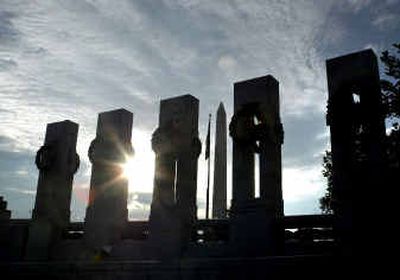War veterans, survivors reflect on faith in God

WASHINGTON – Norman Forde carried a copy of the New Testament in a pocket of his uniform and wore a cross with his dog tags as he fought the Battle of the Bulge as an 18-year-old Army private.
“I was never afraid for my soul,” the World War II veteran said. “My body could’ve been blown up at any time, but my faith didn’t waver.”
Nearly 60 years after the war ended, soldiers who prayed in fields, battleships and jungles for divine protection are converging in Washington and worshipping together. As they prepare for the dedication today of the National World War II Memorial, a series of interfaith services and exhibits is uniting the former servicemen on a spiritual level.
Forde, 79, attended services Wednesday at the Washington National Cathedral, where an exhibit on military chaplains is on display. Now retired, the Silver Spring, Md., resident was commissioned as a chaplain in the Texas National Guard. He served as an Army chaplain through the Vietnam War, counseling soldiers whose experiences stretched the boundaries of their faith.
“When you’re in combat, you pray for safety, you pray for deliverance, you pray to stay alive,” Forde said. “It’s not always apparent how it’s going to happen. It’s a leap of faith.”
On the front lines of World War II, helmeted soldiers clasped their hands in prayer and lowered their gaze as they stole moments to worship during battle. Prayers were whispered within earshot of the enemy, and chaplains scattered across battlefields to give last rites to fallen soldiers.
The former soldiers say their faith was deepened by the sacrifices they made for the war.
“When I wasn’t actually in combat, I was thanking the Lord for getting me through the day or asking his help to get through the next,” said Johnnie Henderson, 79, a Forney, Texas, resident who served in the Army. “When I stepped out of that foxhole and wasn’t killed, I knew that the Lord was right there with me.”
The role of chaplains became vital, and the Army expanded from fewer than 300 chaplains in 1940 to more than 8,000 by the war’s end. Pastors and rabbis were taught to serve troops of any religion.
“I think we all had faith,” said Robert Brooks, 80, who clerked for an Army service unit in the European theater. “We all had faith and knew that everything would work out. We had faith in our fellow man and in our military. We knew that we would overcome. And we had faith in God. We knew he was on our side.”
After the war, Brooks moved to Washington, where he joined an Episcopal church.
The struggle strengthened his commitment to God, he said. Before the war, “it was just life”; after, “it was a readjustment.”
In Britain, a National Day of Prayer was declared on the weekend its troops were evacuated from Dunkirk, France, a precarious move often hailed as a miracle. Joseph Stalin, who opposed organized religion, mobilized the Russian Orthodox Church to serve as the people’s moral force.
Faith also played a tragic role in the war: It was the reason some were singled out for persecution, with 6 million Jews murdered by the Nazis.
Henry Greenbaum was 11 when Nazi soldiers forced his family from their home in Poland. For five years, he toiled alongside other Jewish men, women and children in slave labor camps and endured the horrors of Auschwitz. But at nighttime, in his bunk, he never forgot his faith.
“I always prayed every day, quietly, to myself, for God to help me make it another day,” said Greenbaum, now 61. “I never gave up my faith.”
Across Europe, as Forde’s regiment drove enemy troops out of a forest, he saw God invoked on all sides of the battle. As he looked through belongings left by fleeing German soldiers, Forde found a copy of the New Testament in German.
“I said ‘Lord, what’s going on here?’ ” he said. “We’re fighting here, and they’re fighting us. That raises some questions.”
But he said the atrocities he witnessed never made him question his faith. “Humans are playing out the scenario,” he said. “We have free will, and we can choose to be evil just as we can choose to be good. There’s nothing good about it (war). But maybe it’s trying to stop a greater evil.”